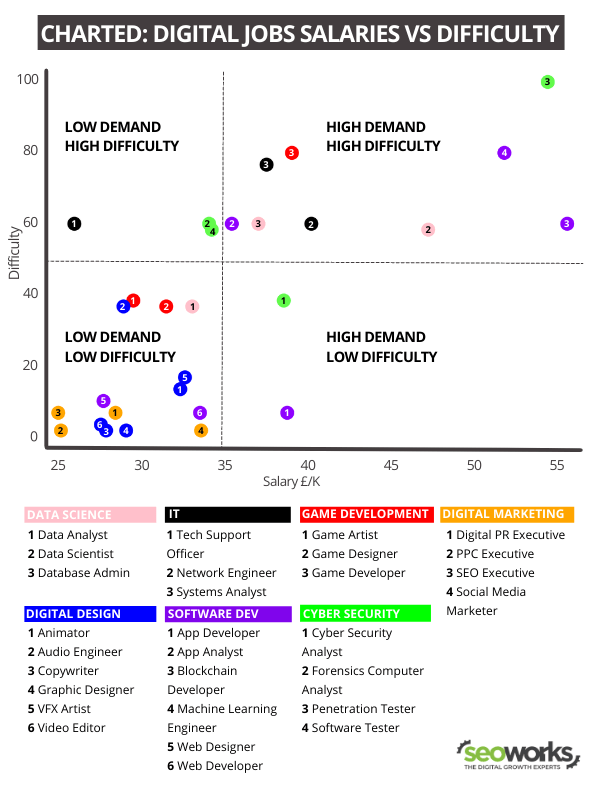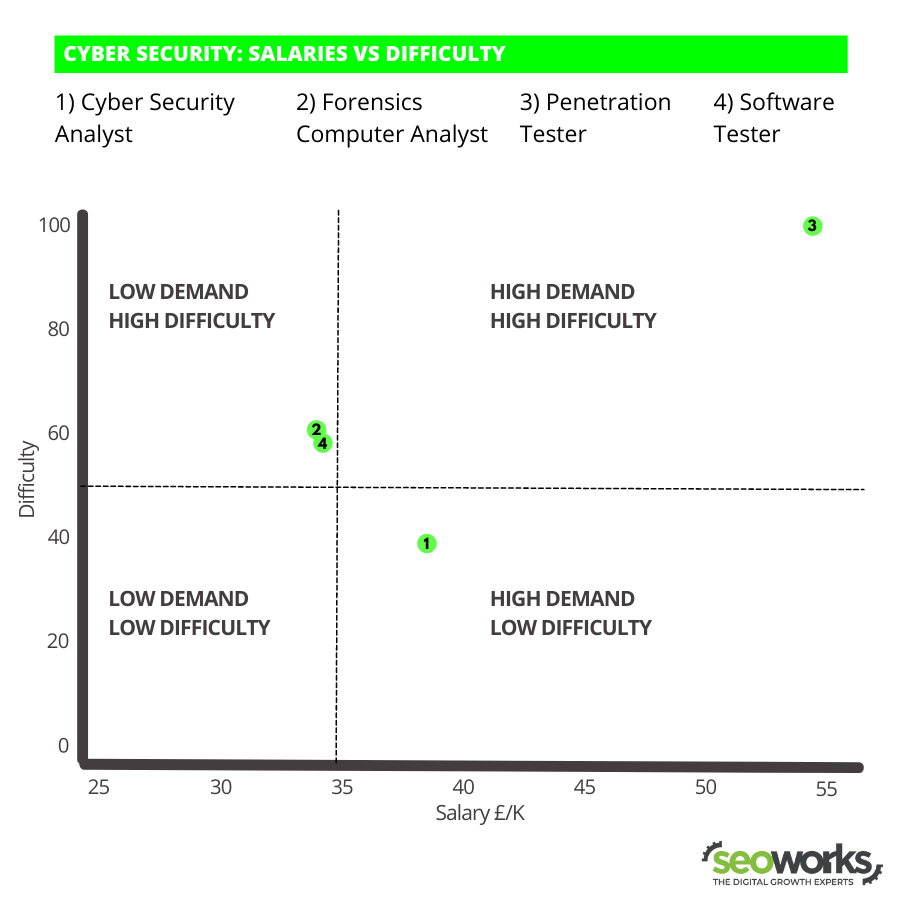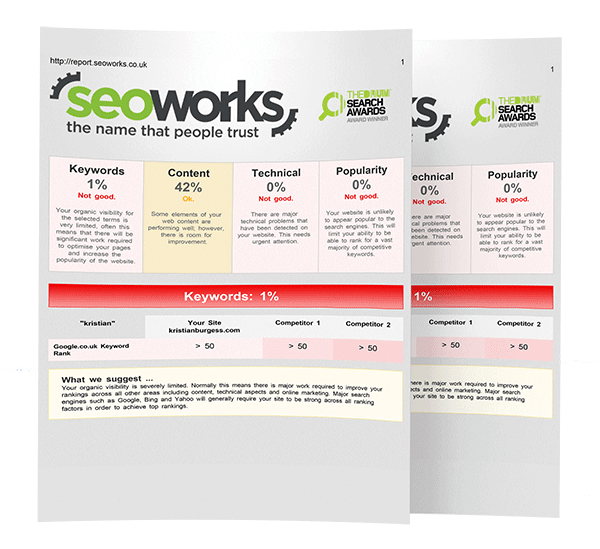The Best Digital Jobs In The UK According To Data
According to a report commissioned by the UK government, 82% of job openings advertised online across the UK require digital skills. The same study attributes a 29% higher salary and a 59% reduced risk of redundancy (due to automation-led obsolescence) for these digital jobs. Not only does this illustrate the importance of digital skills – it also suggests that job openings that do not require digital skills are dwindling and paying less.
While digital industries are booming and demand has never been higher, some niches are easier to break into than others, and some niches pay higher than others. So we here at The SEO Works decided to gather data on the average salary from top UK job boards Glassdoor, Indeed, and Prospects to reveal some of the most in-demand digital jobs along with how difficult it is to get started in them. Here’s what we found.
Methodology
- The data in the study is gathered from job boards Glassdoor, Indeed and Prospects.
- We measured the demand by obtaining the average salary in the UK for each job from Glassdoor.
- We measured difficulty by creating an index that considers the time it takes to learn the essential skills for the job, whether the job needs a university degree and the availability of free information online about the career.
- This gave us a combined score for each of these jobs.
- To add this on a chart we took the highest difficulty score (Penetration Tester) and plotted the rest of the jobs in relation to this on a scale from 0 to 100. So Penetration Tester would be given a score of 100 and Machine Learning Engineer would be 80.1 and so on.
- We then divided the chart into 4 areas depending on the average salary (34,900) and the average difficulty (50) to judge jobs in relation to each other based on demand (salary) and difficulty (how easy is it to get into it).
Digital Jobs: Salaries vs Difficulty

The data shows that the digital industry has opportunities catering to a variety of skill sets as well as a variety of interests.
At a glance, it is not surprising to see a correlation between salaries and job ‘difficulty’ (how many years of training/experience are required), whereby easier jobs tend to pay less, and more ‘difficult’ jobs pay more.
However, there are outliers, and ultimately, all of the sub-industries we analysed are in demand.
We also broke down each of these industries in depth in the following charts:
Software Development

The demand for software has never been higher as most of our life now involves some sort of digital component to it, which means that the need for developers is also at an all-time high. Jobs like Web Developer or Application Developer are ideal for anyone looking to start in software development due to the abundance of information freely available online, and the short time frame it takes for you to get started. However, jobs like Machine Learning Engineer or Blockchain Developer require a lot more time and effort to get into. Most complex software development jobs need a relevant university degree and sometimes even a masters degree. This said, like all industries, as time goes on the barrier to entry will slowly lower as these technologies become more widely adopted and as a result more free information will become more accessible to allow more people to enter these highly in-demand jobs.
Application Developer Has The Best Salary To Difficulty Ratio Of Any Digital Job
Applications have become a part of our daily lives and as a result, so have application developers. With an average starting salary of almost £40,000, it immediately looks like a lucrative career path. However, what makes it one of the best digital jobs is how easily you can find the knowledge you need to grow as an application developer. You do not need a degree and can get started developing your applications with as little as 6 months of learning online through paid courses and MOOCS or even freely available information on places like YouTube.
Blockchain Developer Is The Highest Paid Digital Job
Crypto has exploded over the past few years, and with it, the need for blockchain developers. Blockchain Developer is the highest paid digital job on our chart and for good reason. Blockchain technology is still new which means there is a lot less information out there compared to other software development options like Web Developer or Application Developer. However, like with all technologies, over time this will change and knowledge on how to master blockchain technology will become easier to attain.
Information Technology

The effort and time it takes to get into an industry is not always a reflection of high demand. In fact, according to our data, Information Technology is the worst salary to difficulty ratio of all the digital industries we analysed. IT is a highly relevant industry, however, the need for a university degree as well as the need to have experience makes it a less lucrative opportunity, in the short term, for those looking to get into the digital industry. This said, there is still growing demand for IT, so do not let the extra effort deter you from a great career in the IT industry.
Technical Support Officer Has The Worst Salary To Difficulty Ratio Of Any Digital Job
From a data perspective, Technical Support Officer performs worse than any other digital job in our study. Technical Support Officers are in low demand due to factors such as ease of accessing information online and automation. However, unlike other lower demand jobs, getting into technical support is not as easy as it may seem, as most of these roles demand a degree in a relevant field. Being a Technical Support Officer simply does not have the demand to difficulty ratio it needs to compete with other digital jobs that may be easier to get into and would pay more.
Cyber Security

A huge advantage of many digital careers is that it’s possible for anyone to get most if not all of the skills they need online. This is not the case with cyber security, but this is not necessarily a downside. It might be harder to get into cyber security, but the demand is there and you will be compensated handsomely for your hard-earned knowledge. This is why we find that Cyber Security Analyst has the overall second best difficulty to salary ratio and Penetration Tester is ranked as the second best-paid job on our chart. When technology exists, so does the need to keep this technology safe.
Penetration Tester Is Well-Remunerated, But It’s The Hardest Job To Get Into
Penetration Tester is the second-highest paid job on our chart with an average salary of £54,000. This relatively high salary is because getting into penetration testing needs a university degree as well as 2-4 years of experience in the industry. This means on average it takes 5-6 years to be able to become a Penetration Tester – a high bar to entry when compared with, for example, a job in Digital Marketing. The demand is clearly there, but is it worth pursuing compared to other cyber security jobs, like being a Cyber Security Analyst, which offers a much better demand to difficulty ratio?
Digital Marketing

A key challenge many businesses face is acquiring new customers, which digital marketing is designed to tackle. The timeless nature of learning how to attract an audience and sell to them is what makes digital marketing a great investment of your time and effort.
The beauty of knowing how to market to audiences is that you can use these skills in a wide range of marketing specialities. A great example of this are those who specialised in social media ads on Facebook and now could easily transfer those skills and learn to advertise on TikTok. These skills are not exclusive to those working in the industry. They are equally accessible to anyone looking to get into digital marketing due to the wide range of free, reliable knowledge that provides a solid foundation for anyone wanting to learn any marketing speciality.
Digital Marketing Is The Easiest Industry To Get Into
One of the best things about Digital Marketing is how much free information is out there. You can get a base education in less than 6 months in any digital marketing specificity for free from places like Hubspot, Google Digital Garage or agency blogs which provide fundamental knowledge to anyone looking to get into the industry. It’s also possible to build and develop your experience from scratch by freelancing or starting your own projects – such as a social channel, or a website or blog.
Digital Design

An industry that very few people thought could be a job 10 years ago is now one of the fastest-growing digital industries. Many forms of digital content creation have everything you might want in a job: freely available information, growing demand from businesses, and transferable creative skills that can be useful no matter the content creation method you use. A great example of this would be learning how colours work together to get a viewer’s attention which is vital for both video and photo creators.
The one thing that makes digital design different from other jobs in this study is that most young people already do it without being paid. If you made YouTube videos from your bedroom 10 years ago you might be lucky enough to earn enough money to buy a coffee, but today you can create those same videos for a business and earn a full-time salary.
Digital Content Creation Is An Underrated Niche
Most businesses are starting to become aware that traditional marketing techniques are not as effective in the modern age. Nowadays audience attention can be found on places like TikTok and YouTube, where businesses are unable to breakthrough effectively without the help of content creators. The growing popularity of content has forced businesses to adopt content marketing, and as a result content creators, as an essential part of their marketing strategies.
For creative types, it’s great news that there are so many opportunities to make a career in Digital Design. However, the popularity of Digital Design means that there are many players in the game, which drives salaries down. Having a low barrier to entry means that employers can pay less. To really succeed in this niche, you need to produce work that’s a cut above the rest.
Data Science

The Data Science Industry Is A Safe Bet
If you are struggling to choose a digital industry, data science is probably a safe bet.
All smart businesses and organisations now use data to make decisions, so there is a growing demand for these jobs. It’s also not too hard to get into Data Science compared with some other digital jobs.
All three of the data science jobs we analysed are between 40 and 60 on the difficulty score because of the long time frame associated with getting into data science and the degree requirements a lot of the jobs have. Data Analyst has the best salary to difficulty ratio with Data Scientist just behind it, due to most jobs asking for a relevant university degree. On the other hand, more and more jobs nowadays accept candidates based on their skills and previous work and not their degree alone. This means that you can get into data science without a degree albeit it will be harder to acquire these skills without a structured degree.
More and more businesses nowadays are adopting data as a way to make informed decisions and as a result, the demand for those who work with data is constantly increasing, making it a great choice for those looking to get into the digital industry.
Game Development

Streaming on Twitch is not the only way to make money from the gaming industry – you can help create those very games by getting a job in the gaming industry. The beauty of the gaming industry is that it has jobs of varying degrees of difficulty. The harder the job, the higher the demand for it becomes.
The Gaming Industry Has Jobs For All Different Skill Levels
It’s much easier to become a Game Designer than a Game Developer, however, the salary reflects this difference in difficulty. The great news is that if you’re passionate about gaming, whatever your skillset is, you can get into the gaming industry and you can be rewarded fairly for it.
Which Job is The Best For You?
This chart is one way to consider your future career, but such a big decision is never as straightforward as it might seem at first! So, do not let the chart dictate too much about what you want to go for. One thing is for certain, however – there’s no need to settle for a job you do not enjoy because the digital industry is full of opportunities that can suit both your skillset and your passion.

